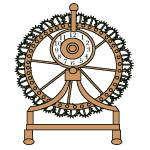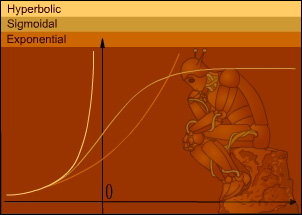Disquisitiones Arithmeticae
Carl Friedrich Gauss
Mathematics is the queen of the sciences.
Carl Friedrich Gauss, from Sartorius von Waltershausen, "Gauss zum Gedachtniss" [1856]
German mathematician, physicist, and prodigy (1777 - 1855)

Gauss was a great guy; apparently he invented the telegraph when he was three, and could sum the first one hundred consecutive natural numbers in his head at school age: 100+1 +99+2+ ....... +51+50 or 50*(100+1)=0.5*n(n+1) when n=100.
So to get an idea of what I'm like its sufficient to know that I'm nothing like Gauss. I could add up when I was three; work out the change given a shilling and buying a bottle of sauce, but I failed my 'o' level maths twice. I didn't even know that DeMorgan discovered 'mathematical induction' until yesterday, and I'm quite old.
Hence the name; Arithmeticae: ancient preferring to philosophise rather than getting down to the hard decimal calculations, mostly approximations.
How do I think about mathematics?
It appeared around the time of Socrates that mathematics was thought of as invented. Indeed this idea is hard to dispute, being founded on assumptions (Axioms), and right up to recent times mathematics is believed to be invented
The mathematics is not there till we put it there.
Sir Arthur Eddington[1882 - 1944], The Philosophy of Physical Science
But the Babylonians[circa 2000 BC] knew Pythagoras[circa 550 BC]theorem long before Euclid[circa 300 BC], Gottfried Wilhelm Leibniz[1646-1716] knew calculus around the same time as Sir Isaac Newton[1643-1727] and clearly neither work is plagiarised.
Mathematics is invented and discovered, if we were not here what would invent it, I've heard of monkeys counting but never postulating over a new theorem.
Prejudicially I think the way we think in psychological terms constrains our achievements, but that is a digression.
Is mathematics hard?
Yes and no,In some schools it is used to strike fear into the hearts of children,or the mathematics teacher is confused, has little mathematical skill and this is picked up by the pupils, but I think it is mainly due to a fear of being seen making mistakes. As you can see it doesn't bother me much and I think there is a lot to be gained by making mistakes. I would have hoped that everybody could embrace mathematical discussion about the plain silly without fear, in the hope that something might come out of it. Sure enough you have to follow the rules or it wouldn't be mathematics, but you don't have to be right all the time.
Mathematics may be defined as the subject in which we never know what we are talking about, nor whether what we are saying is true.
Bertrand Russell[1872 - 1970], Mysticism and Logic (1917) ch. 4
[QUOTATIONS]http://www.quotationspage.com/subjects/mathematics/
Do you fancy some Earl Grey ?
?
42 and the missing 5 or How to see Patterns

The purpose behind this essay is to give an idea of what to expect when tackling a harder than normal problem and is slightly tongue in cheek.

Step one is obviously, find a problem hard enough to be a challenge, it doesn't matter if it is very hard. You may choose a problem with an already known answer and therefore be able to receive help. The benefits are quicker solution, but the drawbacks will be less experience overcoming difficulties. I've never known mathematicians scoff at another's inability to cope with basic ideas, but if you are proud and confident that with practice improvement will follow, why invite mockery. Choosing a problem they can't do guarantees problem solving experience comfortable in the knowledge no-one is going to say your doing that wrong and here is the answer.
Surprisingly it's not hard to find a hard question in mathematics, Number Theory dealing only in whole numbers is full of them, with the added advantage they are easy to state.
One specific problem is "The 3n+1 Conjecture",[Proposed by Professor Brian Thwaites et al] references in the tab for edited entry, states; starting with any positive whole number, generate a new number by the rule, if it is odd multiply it by 3 and add 1, and otherwise divide by two. Applying this rule to every generated new number you get a sequence or collection of numbers terminating in 1. Example; starting with 7 generates 3x7+1=22, divide by 2 gives 11, and so on giving, 7,22,11,34,17,52,26,13,40,20,10,5,16,8,4,2,1, done!
At first their is a feeling of exhilaration with the prospect of solving such a hard problem, but that soon succumbs to feelings of inadequacy, staring at space without a clue how to proceed. It is a good idea to write something down in order to try and understand the problem, make it your own and get close to it. In this case lists of completed sequences might be helpful, try to calculate them without the use of a calculator because the mental practice is needed to sharpen the mind, and it helps block out distraction, because you are going to have to get up and very close to this problem. Distraction is your enemy stay focused.
Of course writing down lists on their own will not solve the problem, but at least it is something to look at, and you should be looking for some sort of pattern, it may even be useful to reformulate the problem into something more familiar.
It is important to read, to get away from the problem and avoid fixation. Ask questions about what you read and make sure you understand the answers, because they may be useful. Don't be embarrassed on finding the answers show you have missed the obvious, but remember what is important is your continual improvement and you therefore will be better placed to ask good questions and importantly, solve the problem.
Many setbacks will follow, you may have noticed the algorithm can be processed by a computer, and by reading and asking questions learn about Turing[1912-1954] and this thing called a Halting problem[1937],loosely meaning computers will
 never be able to decide if the sequence halts or not. With humility you may then decide that without evidence computers are and always will be inferior, to err on the side of caution, and look for another approach not explicitly using the algorithm. This may mean the complete abandonment of your original ideas and starting again.
never be able to decide if the sequence halts or not. With humility you may then decide that without evidence computers are and always will be inferior, to err on the side of caution, and look for another approach not explicitly using the algorithm. This may mean the complete abandonment of your original ideas and starting again.
Different approaches lead to different difficulties and be prepared to be forced to change approach several times, you will then be experiencing the same roller coaster feelings that the greatest exponents in your field experience everyday. But it is not as important to solve the problem, as gain from the experience tackling it, with positives of focused reading, better directed questioning and the lateral thought[Edward DeBono] experience in your problem solving skills.
Eventually the problem will be stored in the back of the mind or solved, but you will be better equipped for the next challenge.
Now about 42 and the missing 5; 42 is the least non-trivial (not of the form 2n) even whole number that doesn't generate a sequence with a 5 in it.
Some useful references are included, a free course in how to study, some very interesting sites related to Turing, a lecture about undecidability that's not to technical, and ways to think out of the box.
Link to the 3n+1 Conjecture>Lateral Thinking
OU Free Course
Alan Turing
Turing Machines
Undecidability Lecture
| By Swami Krishnananda Giri Since time immemorial From Plato to Plotinus and Aristotle to Einstein, Man has been trying About his nature and My nature To speculate. In Satyug he did much better but not in this so-called modern age. In the days of old Man could feel My nature whole, But since the days of Newton He began to separate, My nature in different aspects of matter, And began seeking, In his experiments and equations, To estimate. In the middle ages And through revolution industrial, Man tried to calculate My nature by his equations, Of fields and waves, And in his experiments To duplicate. Fail as he did again and again, Faced with contradictions, My nature to explain, I sent my children like Planck and Bohr With some hints about the puzzle Which led to this speculation Of the quantum state. Some thought of Me as a particle, Others as a wave. And to my delight, they had a good fight Over my real state. |
Then came the stalwarts, Like Einstein and Heisenberg All the old thoughts about Me To eliminate. But in the process they opened Another Pandora's box, Which brought out new problems In real great spate. Some looked at my nature Minute and particulate. Other my nature Cosmic, And wondered, unable To articulate. Some thought of Me as a Big Bang, Expanding forever, others, steady state Yet others there were who thought, I do oscillate. Then came out the black holes, and worm holes Of Hawking and Penrose, who think they know, But cannot capture Me in their equations, As through those very holes Do I escape. Some think of me as " unnecessary" Philosophical baggage, Not knowing who, in them, is thinking so. And feel that all that is needed Is a "Theory of Everything" Of ten strings and nineteen Dimensional space. |
Some, like Bohm, thought they went deeper, But came up with more substitutes, Such as the unfolding enfolding universe, Of his Order Implicate. With computers, some thought, They could overcome The limitations imposed on them By their linear approximations, Only to discover, my chaotic state. Feigenbaum numbers, and Lorentz's butterflies, revealed some of my beauties. Through which I tried to give some hints, Including the Mandelbrot set, only to let them Know, how I constantly bifurcate. Then came those, like Wheeler and dealers Like Davies, who put the cart before the horse, and say that in chance ordering of matter Did their own consciousness Originate. Through all this endeavor, And thanks also to Godel and Bell, Some have at last realized, That eventually they must Capitulate. For, to know My true nature, Is to know their true nature Which may be done Only when one stops everything, And sits to meditate. |
Mind, breath and prana controlling, Forgetting past and future, And by going deep within, Learn to concentrate. If the Michio Kakus of today Had the real GUT, to do just this much, They would discover, all the ten strings Right within themselves, With six of them curled up, at Planck energy, In their own spines, At its very base. They will also see The black holes and worm holes, Right within them. All they have to do is Penetrate. With patience, practice and grace, They will experience, see and hear The vibrating strings within them, In infinite dimensions do they Reverberate. Then will man realize, That as the 'ego' he himself is a particle And as the soul a wave, Through which, by his own choice, My consciousness did manifest As small or great. When through constant meditation, He will choose this particle nature of his To eliminate, He will realize his oneness with Me As the ocean of Bliss Consummate. Life Positive, July 1997 |
WARNING, this journal is radio-active

eπi+1=0

A link to latest research
Latest Messages
| Messages left for this Researcher | Posted |
|---|---|
| Where is my new debit card | Mar 12, 2011 |
| 42 | Feb 27, 2010 |
| Ahoy PAL my ole shipmate | Feb 10, 2010 |
| Little edit thingy | Jul 24, 2009 |
| Personal space | Apr 23, 2009 |
Conversations
| Conversation Title | Latest Post | Latest Reply |
|---|---|---|
| Nonsense verse; or the silliness of the iambs | Oct 16, 2012 | 6 Days Ago |
| Assorted Poetry | No Posting | 3 Weeks Ago |
| This could go either way ... | No Posting | Oct 23, 2023 |
| Prediction and aftermath | No Posting | Jan 23, 2021 |
| Things that make you go "hmmm" | No Posting | Jan 13, 2021 |
Pirate Alexander LeGray
Researcher U11070054
Entries
Most Recent Edited Entries
- This user has not written any Edited Entries.
Entries
Disclaimer
h2g2 is created by h2g2's users, who are members of the public. The views expressed are theirs and unless specifically stated are not those of Not Panicking Ltd. If you consider any Entry to be in breach of the site's House Rules, please register a complaint. For any other comments, please visit the Feedback page.
Write an Entry
"The Hitchhiker's Guide to the Galaxy is a wholly remarkable book. It has been compiled and recompiled many times and under many different editorships. It contains contributions from countless numbers of travellers and researchers."